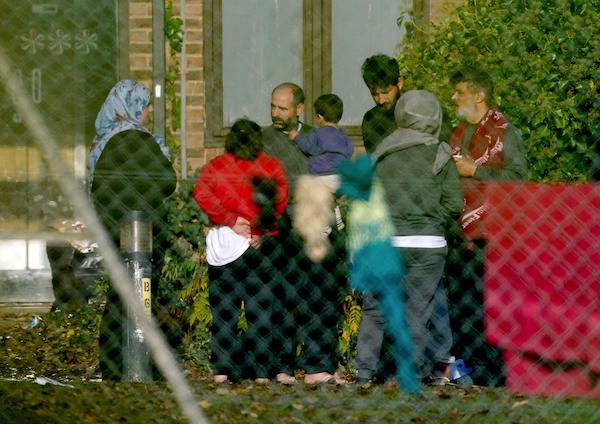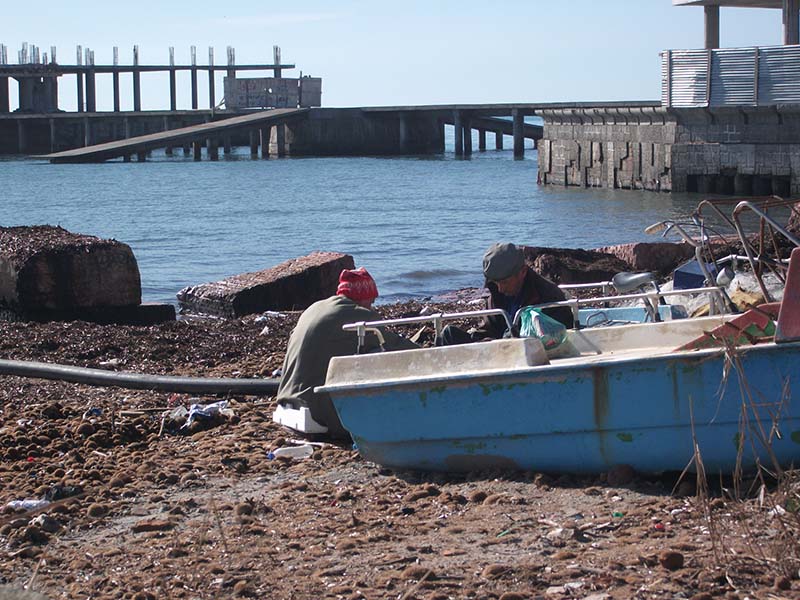Albania is a spectacularly beautiful but very unlucky country. In the turbulent times after WW2 it fell under the control of Enver Hoxha, a Stalinist dictator who maintained a paranoid and terrifying regime for four decades, executing anyone who might challenge his authority. Some 38 priests were martyred, and anyone caught trying to flee the country was shot dead.
When Hoxha died, Albania was desperately poor and totally isolated from the rest of the world. In 1992, the country morphed itself into a democracy, but change has been pitifully slow. Changes of government have replaced one corrupt entity with another. A Ponzi pyramid scheme in 1997 beggared a large proportion of the population, leading to mass demonstrations and a civil war where more than 2,000 people lost their lives. (The availability of arms from this war fuelled the conflict in Kosovo, leading to the 1999 NATO intervention.)
It is against this background that Albanians have been trying to pick up the pieces ever since. Corruption remains endemic; unsurprisingly, many Albanians flee the country in search of better lives. After long bondage, there is a strong desire to be free. Albania haemorrhages a brain-drain of the more qualified, while the exodus of the young and less skilled is exploited by a criminal underworld, offering the promise of a better future in Europe and the United States. In reality, many of the most vulnerable fall prey to trafficking gangs and end up in forced labour or the sex trade. Prospects of escape are grim – some abuse victims, even if they escape their pimps, face rejection by families and communities and have no way of making a living.
More than a quarter – 27 per cent – of all trafficking victims in the UK are Albanian. Unseen victims on our streets, in all our towns and cities, endure the violence, trauma and despair of brothels and forced labour. They need rescue, help, healing and support to rebuild their lives.
Much needs to be done in Albania, at the governmental level, to address the conditions that create the cocktail of despondency that leads to this exodus. But more also needs to be done at the local level, in villages and small towns, to deter potential victims from joining the queue, by helping them towards a brighter future in their own beautiful and potentially prosperous country.
This was the challenge taken up by the IBVM order, as part of their “Courage to Move” initiative in 2005. Sr Imelda Poole moved to Albania to live and work there, learn the language, get to know people and work with them to explore ways to make progress. She has been living there ever since and, with her Albanian co-workers, building a network of help for survivors of human trafficking and exploitation, together with community development projects to offer opportunities to young people in the most neglected and remote communities.
This led IBVM in 2013 to co-found the NGO Mary Ward Loreto, under Albanian law. Its goal is to underpin what has already been achieved in the ongoing mission against human trafficking. Ana Stakaj, who became its chief executive in 2019 as one of a new three-member leadership team, describes their philosophy: “Our work is firmly rooted in two strongly held convictions. First, sustainable change is only achieved by empowering people to be their own agents of change. Secondly, Mary Ward Loreto can, and should, nurture Albanian democracy by outreach to and training offers for public servants, and by raising public awareness that human trafficking, domestic violence, gender-based violence and children’s rights affect the whole community.”
The executive team oversees six advice service centres around Albania, with an emphasis on areas where there is a paucity of support by other organisations. While their work is underpinned by a focus on prevention of trafficking and rescue of victims, there is a range of additional activities, dependent on the local context. These evolve according to community needs, and very much rely on participatory decision-making.
The first advice service centre, in Tirana, was based on best practice of several Citizens Advice Bureaux in the UK, which the Mary Ward Loreto coordinator visited in 2016. The advice service centres provide clients with appropriate services and ensure access to public services. These include emergency food and sanitary supplies, specialised medical and psychological treatment, advice on access to public services, emergency accommodation for victims of domestic and gender-based violence and referral to shelters for accommodation and re-integration.
As the work of Mary Ward Loreto has become better known, many local government workers and officials – some of who are political appointees with little training – are turning to the charity for help to develop their own skills and improve the service they offer.
Beyond immediate response to emergency needs, Mary Ward Loreto has developed a proactive approach, to prevent violence and exploitation before they occur. The aim is economic empowerment of young people, especially in the remote and poorly served areas where people-traffickers do much of their recruiting. Young adults are offered vocational training, careers advice, training in IT, work ethics and health and safety. On-the-job training and job opportunities are negotiated with local businesses. Start-up help is offered and ongoing coaching and mentoring for sustainability and growth.
These two strands of work generate a third – a civic education approach which offers young people a programme of training for transformation. This includes leadership, community activism, healthy relationships and self-realisation. The programme is sustained by the creation of youth clubs, which, with guidance from trainers, develop an action plan to continue their activities once the training is ended. An important element of the civic education programme is service-learning – an educational approach that combines learning objectives with community service, to provide a pragmatic learning experience while meeting societal needs. Learners conduct a community needs assessment, identify priorities and draw up a plan of action to address these.
This threefold approach – emergency aid, economic empowerment, social transformation – may seem ambitious, but Mary Ward Loreto can already point to many individual success stories and wider social impacts. Victims of trafficking are helped to rebuild their lives, with counselling provided by Mary Ward Loreto. Some, who cannot at present return safely, are helped to build new lives and contribute to UK society.
|
Marsela, now 27 years old, is a nurse in a UK hospital. She was trafficked and exploited in Italy, the Netherlands and England for 3 years. She was rescued with the help of a client at the brothel, who she begged for mercy. After her escape, she spent 22 months in a safe house, where she was helped with the asylum seeking process and given online counselling to recover from trauma and to build a future for herself. She learned English quickly and trained as a nurse. Marsela grew up in a mountain area in Northern Albania. Her family moved to Tirana when she was fourteen, but they kept their traditions and patriarchal mentality and social pressure prevented her from starting high school. After many arguments, she managed to go to school the following year. Still, she recalls her father and her brother talking every day about stopping her schooling again. Since she was one of the best students, the teacher managed to persuade her father to allow her to study. In the last year of school, she met her boyfriend. When her family found out, they forced her into an arranged engagement to a man 16 years older than her. Five months later, she escaped with her boyfriend who promised her they would get married in Italy and start a new life. As soon as they reached Italy, he sold her to traffickers. After being rescued in the UK, she tried to get in touch with her mother, but she responded that Marsela had brought shame and disgrace on their family and if she ever returned to Albania, her father and brother would kill her.
|
Rescue is important, but prevention is better. A young man from a remote village, whose future looked very grim, transformed his life prospects with help from Mary Ward Loreto.
|
My name is Jetmir and I am 20 years old. I live in the village of Bardhaj. When I finished middle school, I had no choice but to stay at home because my family’s circumstances prevented me from attending high school. It was a tremendously difficult period for me because of the social isolation and complete lack of prospects I faced. I heard about the Mary Ward Loreto Foundation in Rreshen and I approached them. They supported me in achieving vocational training as a mechanic. As well as that, staff helped me to finish my school education. So now, in July 2022, I proudly graduate from high school. Unlike before, I now have options for my future.
|
Albania's hope is centred in its young people. Their energy, ideas and ambitions for themselves and their country are at the core of MWL's work. They need and deserve support from the outside world to overcome the damage of their history, and build up their country's civil society so that other young people will choose to stay.
Bill Morrell, formerly a strategic advisor to the Chief of Police in Albania, was on the board of Mary Ward Loreto Foundation in Albania and is currently a trustee of Mary Ward Loreto UK. He says: “Albania is a great country with stunning mountains and a riviera in the south opposite Corfu but at half the price. The interior still has a feel of a bygone age where tourists are given a warm welcome.” He is a witness to Albania's attempts to overcome the legacy of its disastrous history: “Endemic corruption in government and public services remains a concern, but there is a growing minority actively challenging this curse and the international community continues to help overhaul the institutions that allow corruption to thrive.
“What the country desperately needs is help at a grass-roots level to build up communities and support the creation of economic livelihoods which give people, especially the young, hope for the future and make them less vulnerable to trafficking gangs. The Mary Ward Loreto Foundation, under the inspiration and leadership of Sister Imelda, has been at the forefront of this endeavour for more than a decade. What she desperately needs is the funding to enable her organisation to build on existing achievements and extend its outreach.”
Albania's journey of hope will be the focus of a special Carol Service to be held in Westminster Cathedral on Thursday December 1st, 2022, at 7.30pm.
Entrance is free, all welcome.
There will be a collection for the work of Mary Ward Albania.
Please consider supporting the projects run by MWL Albania.
Website: www.marywardloreto.net
UK donations can be sent to Mary Ward Loreto UK,
UK Reg. charity no 1192478,
Bank details Bank Charities Aid Foundation(CAF) Bank
Account Mary Ward Loreto UK
Account number 00034378
Sort Code 40-52-40
Hilary Cashman is a retired prison librarian, and author of Christianity and Child Sexual Abuse, SPCK, 1993. Bill Morrell is a retired police officer with extensive experience of working in conflict and post conflict countries. He worked as Strategic Advisor to the Chief of Albanian State Police 2014 – 2019 and was on the board of Mary Ward Loreto Albania. Both are trustees of Mary Ward Loreto UK.
With additional input from Ana Stakaj and Imelda Poole.



 Loading ...
Loading ...
What do you think?
You can post as a subscriber user ...
User comments (0)